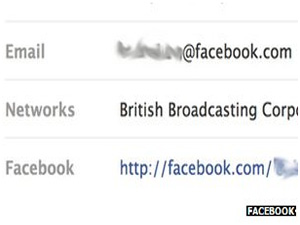



Date:27/06/12
 Facebook is facing a backlash from users after replacing email addresses listed in members' contacts with those provided by its @facebook.com system.
Facebook is facing a backlash from users after replacing email addresses listed in members' contacts with those provided by its @facebook.com system.
The company said it had acted to make details "consistent" across its site. If Facebook's email system takes off it could drive more traffic to the firm's pages helping boost advertising sales.
But some users have branded the move "annoying" and "lame" and publicised instructions on how to display original addresses instead of the Facebook ones. Facebook first announced plans for the move in April, although the news attracted little attention at the time.
"We are providing every Facebook user with his or her own Facebook email address because we find that many users find it useful to connect with each other, but using Facebook email is completely up to you," said a statement from the company. Emails sent to @facebook.com addresses appear alongside posts sent via the network's internal message system, allowing users to pick up both types of communication from the same place.
Annoyed users
One analyst told the BBC the effort could backfire.
"It reeks of the same move Google did with its Buzz product when it automatically opted people in, and users recoiled against the action," said Anthony Mullen, interactive marketing analyst at Forrester Research.
"This is a direction Facebook needs to move in - your email is a proxy for your identity on the internet and Facebook want to usurp people's pre-existing email identities with their own to help drive up traffic to its site and lock users into its service.
"The problem is the lack of transparency - it has acted without asking for members' permission first."
Messages posted to the rival social network Twitter suggested the move had annoyed some users.
"Warnings would have been nice Facebook, don't just go and change email addresses," tweeted Josselyn Arundell from Manchester.
"More stunningly bad work from Facebook," posted London-based Darren Gough."Good idea to get people to use it. Poorly executed!!!" added Brent Jagodnik from California.
Few messages supported the move.
Users wishing to undo the change can do so by clicking on the "about" link in their profile and then clicking the "edit" button next to their contact information.
They then need to click make their Facebook email address "hidden from timeline" and then - if they wish - make one or more of their other preferred addresses visible.
Facebook's email switch prompts criticism by users
 Facebook is facing a backlash from users after replacing email addresses listed in members' contacts with those provided by its @facebook.com system.
Facebook is facing a backlash from users after replacing email addresses listed in members' contacts with those provided by its @facebook.com system.The company said it had acted to make details "consistent" across its site. If Facebook's email system takes off it could drive more traffic to the firm's pages helping boost advertising sales.
But some users have branded the move "annoying" and "lame" and publicised instructions on how to display original addresses instead of the Facebook ones. Facebook first announced plans for the move in April, although the news attracted little attention at the time.
"We are providing every Facebook user with his or her own Facebook email address because we find that many users find it useful to connect with each other, but using Facebook email is completely up to you," said a statement from the company. Emails sent to @facebook.com addresses appear alongside posts sent via the network's internal message system, allowing users to pick up both types of communication from the same place.
Annoyed users
One analyst told the BBC the effort could backfire.
"It reeks of the same move Google did with its Buzz product when it automatically opted people in, and users recoiled against the action," said Anthony Mullen, interactive marketing analyst at Forrester Research.
"This is a direction Facebook needs to move in - your email is a proxy for your identity on the internet and Facebook want to usurp people's pre-existing email identities with their own to help drive up traffic to its site and lock users into its service.
"The problem is the lack of transparency - it has acted without asking for members' permission first."
Messages posted to the rival social network Twitter suggested the move had annoyed some users.
"Warnings would have been nice Facebook, don't just go and change email addresses," tweeted Josselyn Arundell from Manchester.
"More stunningly bad work from Facebook," posted London-based Darren Gough."Good idea to get people to use it. Poorly executed!!!" added Brent Jagodnik from California.
Few messages supported the move.
Users wishing to undo the change can do so by clicking on the "about" link in their profile and then clicking the "edit" button next to their contact information.
They then need to click make their Facebook email address "hidden from timeline" and then - if they wish - make one or more of their other preferred addresses visible.
Views: 1340
©ictnews.az. All rights reserved.Similar news
- 24% of U.S. Adults have made phone calls on the Internet
- UNESCO puts sustainable learning online
- Australia gives incentives for the use of telehealth
- US launches computer programme for poor kids
- UN declares web access as human right
- Facebook growth slows in stalkerbase heartlands
- One Third of Millionaires Use Social Media
- Facebook Seeks Bigger Role in Software for Mobile Apps
- Icann increases web domain suffixes
- IBM launches new social networking platform for enterprises
- Google Notches One Billion Unique Visitors Per Month
- Internet providers cut international channel renting costs by 60%
- Azerbaijan launches standard time on internet
- Icann launches facility to ease DNSSec adoption
- Social network data mining yields worrying results for traditional media





















